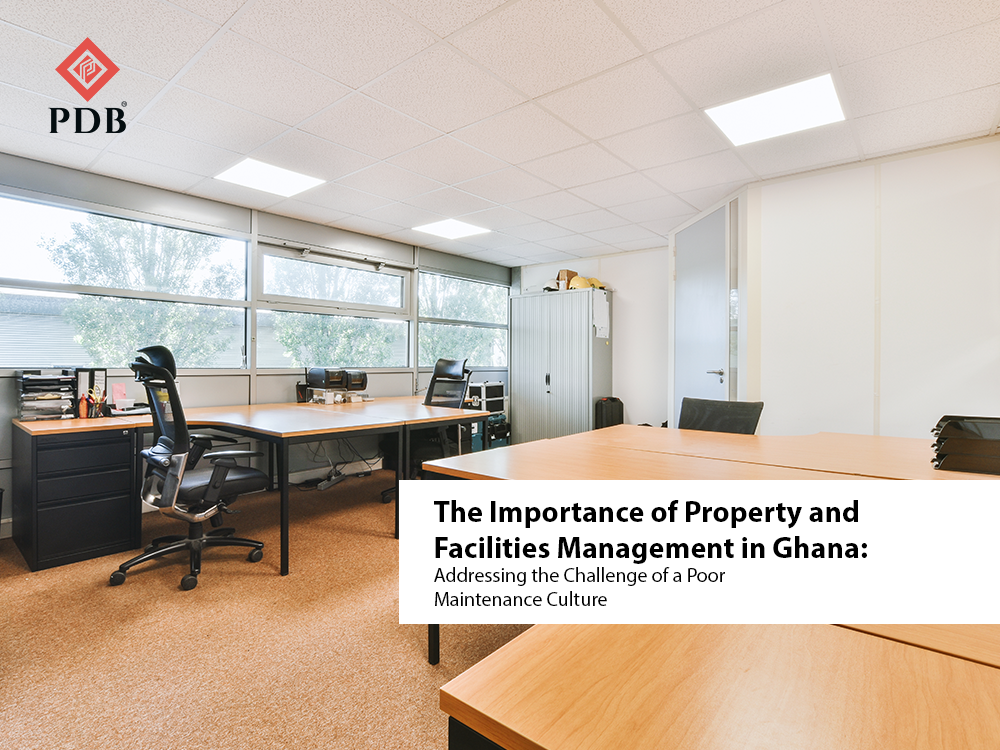Insight
Home / Blog

The Importance of Property and Facilities Management in Ghana
- 0
- 0
- 0
Introduction
Effective property and facilities management is not merely a convenience but a fundamental requirement for businesses and property owners, especially in Ghana. The country's rapid urbanization and economic growth have led to a significant increase in property developments, both commercial and residential. However, Ghana, like many developing nations, faces a persistent challenge: a poor maintenance culture. In this article, we delve into the crucial role of property and facilities management and the pressing need to address the issue of inadequate maintenance practices in Ghana.
The Role of Property and Facilities Management
Property and facilities management encompasses a wide range of responsibilities, including maintaining the physical condition of buildings, ensuring safety and security, managing finances, and optimizing the overall performance of properties. Here's why effective management is vital:
1. Asset Preservation:
Well-maintained properties retain their value over time. Property and facilities management teams focus on regular maintenance and repairs, preventing the deterioration of structures and systems. In Ghana, where many buildings are subject to the challenges of tropical weather, proactive maintenance is crucial to protect investments.
2. Cost Efficiency:
Effective management helps reduce operational costs in the long run. By identifying and addressing issues promptly, property owners can avoid costly emergency repairs and replacements. This is particularly significant in a country like Ghana, where resources may be limited, however, some government properties are poorly managed and deteriorate over time, leading to extra costs for the government for repairs/renovations etc. This can be avoided with property and facilities management.
3. Safety and Compliance:
Ensuring the safety of occupants and compliance with regulations is paramount. Property managers in Ghana must be well-versed in local building codes and safety standards to mitigate risks and liabilities. Avoidance of such satisfactions can lead to legal matters in the future.
4. Tenant Satisfaction:
Happy tenants are more likely to stay and renew their leases. Property managers play a vital role in tenant relations, addressing concerns promptly and ensuring a pleasant living or working environment.
5. Improved Marketability:
Well-maintained properties are more attractive to potential tenants or buyers. This enhances marketability and rental or resale value. In Ghana's competitive real estate market, this is a significant advantage.
The Challenge of Poor Maintenance Culture in Ghana
Despite the importance of property and facilities management, Ghana faces a significant challenge—a poor maintenance culture. This issue manifests in several ways:
1. Short-Term Thinking:
Many property owners prioritize short-term gains over long-term sustainability. This mindset often leads to neglect of maintenance, which, in turn, leads to costly repairs later.
2. Lack of Skilled Workforce:
Ghana grapples with a shortage of skilled maintenance technicians and property managers. Currently in Ghana, there is only one university that offers a course in Facilities Management. To address this, investment in vocational training and education is essential, and the utilization of property management companies such as PDB. Some examples of PDB-maintained properties are the Millenium office complex at Ridge, and the Jospong office complex at Spintex.
3. Inadequate Planning:
In many cases, maintenance is treated as a reactive measure rather than a proactive strategy. This results in the deterioration of properties and higher costs in the long term.
4. Limited Access to Resources:
Some property owners may lack access to the necessary resources, such as funds and materials, to carry out proper maintenance.
Addressing the Challenge
To address the problem of poor maintenance culture in Ghana, several steps can be taken:
1. Education and Training:
Promote awareness about the importance of maintenance and invest in vocational training programs to develop a skilled maintenance workforce.
2. Long-Term Planning:
Encourage property owners and businesses to adopt a long-term view of property management. Emphasize the cost-saving benefits of proactive maintenance.
3. Access to Resources:
Facilitate access to resources by connecting property owners with financing options or government incentives for maintenance projects.
4. Regulatory Enforcement:
Strengthen enforcement of building codes and regulations to ensure that properties meet safety and maintenance standards.
Conclusion
Effective property and facilities management are indispensable for businesses and property owners in Ghana. You can defer it but cannot avoid it. It not only preserves the value of assets but also enhances safety, lowers operational costs, and improves tenant satisfaction. However, to fully realize these benefits, we must tackle the challenge of a poor maintenance culture. By investing in education, training, and long-term planning, the nation can promote responsible property management practices and ensure the sustainability of its real estate assets.
By, Jemimah Alemna
Communications Manager


Mario Smith
Jun 25, 2021
" I couldn't have asked for a better real estate agent than PDB. Their market expertise and negotiation skills were top-notch. I'm thrilled with my new home!"
Mary Tyron
Mar 23, 2022
" I want to express my gratitude to PDB for their exceptional service. They helped me find the perfect rental property, and their responsiveness made the process quick and easy."
Leo Williams
May 23, 2020
" If you're looking for a real estate agent who truly cares about your needs, PDB is the one to choose. Their guidance and support were instrumental in our successful home purchase."